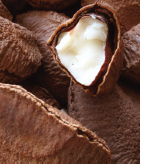Obesity is a chronic disease associated with an inflammatory process resulting in oxidative stress that leads to morpho-functional microvascular damage. This study was undertaken to assess the effect of Brazil nuts (Bertholletia excelsa) on antioxidant capacity, lipid and metabolic profiles and nutritive skin microcirculation in obese adolescents. Obese female adolescents (n=17; mean age 15.4 years; mean BMI 35.6 kg/m2) were randomized into two groups with their diet supplemented either with Brazil nuts [BNG, 15-25g/day (equivalent to 3 to 5 units/day)] or placebo [PG (lactose), one capsule/day] and followed for 16 weeks. At baseline, both groups shared similar characteristics. After the intervention, intra-group analysis revealed that BNG had increased selenium levels (p=0.02), red blood cell velocity (RBCV) (p=0.03) and peak red blood cell velocity (RBCVmax) (p=0.03) and reduced total (TC) (p=0.02) and LDL-cholesterol (p=0.02). Compared to PG, Brazil nuts intake reduced TC (p=0.003), triglycerides (p=0.05) and LDL-ox (p=0.02) and increased RBCV (p=0.03). The authors concluded that consumption of Brazil nuts improved the lipid profile and microvascular function in obese adolescents, possibly due to its high level of unsaturated fatty acids and bioactive substances, such as selenium, α- e γ- tocopherol, and folate. HYPERLINK “http://www.ncbi.nlm.nih.gov/pubmed?term=Brazil%20 nuts%20intake%20improves%20lipid%20profile%2C%20oxidative%20stress%20and%20microvascular%20function%20in%20obese%20 adolescents%3A%20a%20randomized%20controlled%20trial”Nutr Metab (Lond). 2011 May 28;8(1):32. PMID: 21619692
Home Research News Brazil nuts intake improves lipid profile, oxidative stress and microvascular function in...









